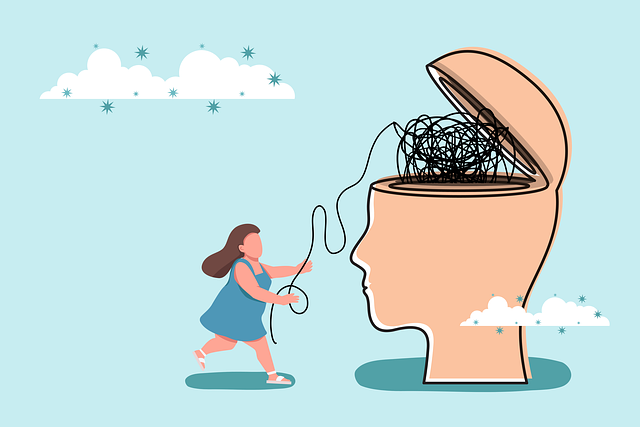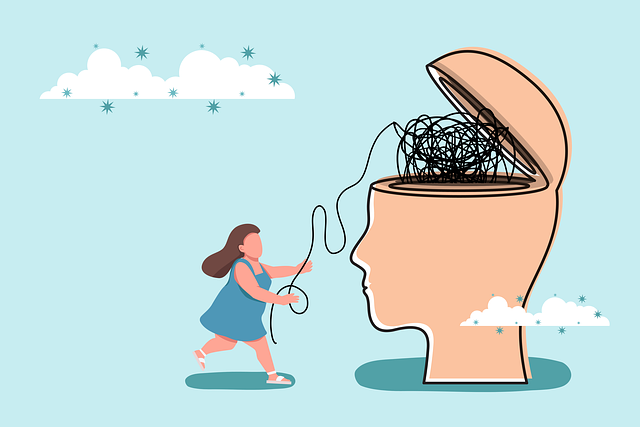Depression, a complex mood disorder with various contributing factors, is preventable through proactive measures like stress management workshops and lifestyle modifications in Colorado Springs. Organizations like Colorado Springs Adjustment Disorder Therapy emphasize the importance of balanced diets, regular exercise, adequate sleep, and self-awareness practices like Mental Wellness Journaling to build resilience. Public awareness campaigns destigmatize mental health issues, encouraging early intervention. Therapy, including CBT and support groups, equips individuals with emotional management skills and strengthens social connections. Colorado Springs adjustment disorder therapy integrates stress management techniques, mindfulness, physical activity, and healthy sleep habits to prevent and manage depression effectively.
Depression is a prevalent yet manageable condition with various prevention strategies. This guide explores effective ways to combat this mental health challenge, offering insights tailored for individuals in or around Colorado Springs seeking support. From understanding depression’s causes, such as adjustment disorders, to adopting lifestyle changes and discovering the benefits of therapy and support groups, these strategies empower you to take control of your mental well-being. Learn how building resilience through coping and self-care can be a game-changer in preventing and managing depression.
- Understanding Depression and Its Causes
- Lifestyle Changes for Improved Mental Health
- The Role of Therapy and Support Groups in Prevention
- Building Resilience: Coping Strategies and Self-Care Practices
Understanding Depression and Its Causes

Depression is a complex mood disorder that can significantly impact an individual’s daily life and overall well-being. It’s essential to recognize that it’s more than just feeling sad or disappointed; depression persists for extended periods, affecting how one thinks, feels, and acts. In Colorado Springs, many individuals are turning to therapy to manage this condition, specifically focusing on the adjustment disorder that often arises in response to stressful life events.
There are various factors that contribute to depression, including genetic predisposition, brain chemistry imbalances, hormonal changes, traumatic experiences, or significant life stressors. The latter is a key area where self-care practices and communication strategies can play a pivotal role in prevention. By learning effective stress management techniques and adopting healthy habits, individuals can build resilience against depressive episodes. Stress Management Workshops Organization, for instance, offers valuable resources to teach participants practical tools for dealing with stress, which can be a proactive step towards depression prevention.
Lifestyle Changes for Improved Mental Health

In the pursuit of depression prevention, lifestyle changes often prove to be powerful tools for improving mental health. Colorado Springs Adjustment Disorder Therapy emphasizes this aspect as a key component in managing and preventing depressive episodes. Simple yet effective shifts can include adopting a balanced diet rich in nutrients that support brain health, engaging in regular physical activity to release endorphins and reduce stress, and prioritizing quality sleep to restore the mind and body. Mental Wellness Journaling Exercise Guidance can be a valuable practice, encouraging individuals to reflect on their thoughts, emotions, and experiences, fostering self-awareness and resilience.
Beyond individual practices, Public Awareness Campaigns Development plays a crucial role in destigmatizing mental health issues and promoting early intervention. By sharing resources, stories of recovery, and signs of distress, these campaigns empower individuals to seek support from trauma-informed services like those available in Colorado Springs. This collective effort contributes to building a more supportive community, where people feel encouraged to prioritize their mental wellness.
The Role of Therapy and Support Groups in Prevention

Therapy plays a pivotal role in preventing depression by providing individuals with essential tools to manage and overcome challenging emotions. Colorado Springs Adjustment Disorder Therapy, for instance, offers a structured framework to help clients understand their feelings and behaviors, fostering self-awareness and coping mechanisms. Through various therapeutic approaches, such as cognitive-behavioral therapy (CBT), individuals learn to identify negative thought patterns and replace them with healthier alternatives, thereby reducing the risk of depression.
Support groups complement therapeutic interventions by offering a safe and non-judgmental space for sharing experiences and building social connections. These groups encourage compassion cultivation practices, where members learn to be kinder and more understanding towards themselves and others. By integrating Stress Management and Stress Reduction Methods into their routines, participants can effectively navigate life’s stressors, minimizing their impact on mental health. This holistic approach ensures that individuals receive comprehensive support in preventing and managing depression.
Building Resilience: Coping Strategies and Self-Care Practices

Building resilience is a cornerstone in preventing and managing depression. Coping strategies play a pivotal role in enhancing one’s ability to navigate life’s challenges. Through Colorado Springs adjustment disorder therapy, individuals can learn effective methods to confront and overcome stressors that contribute to depressive episodes. This includes practicing mindfulness, engaging in regular physical activity, and adopting healthy sleep habits—simple yet powerful tools to bolster mental fortitude.
Self-care practices are integral to fostering mental wellness. Keeping a Mental Wellness Journaling Exercise Guidance can serve as a daily ritual for introspection and reflection. By documenting thoughts, emotions, and experiences, individuals gain valuable insights into their psychological state. This practice not only promotes self-awareness but also provides an outlet for expressing and processing complex feelings. Incorporating stress management techniques, such as deep breathing exercises or progressive muscle relaxation, further complements these efforts in cultivating resilience and enhancing overall mental health, especially for those at risk as determined by a comprehensive Risk Assessment for Mental Health Professionals.
Depression prevention is a multifaceted approach that combines understanding, proactive lifestyle changes, therapy, support groups, and building resilience. By implementing these strategies, individuals can effectively manage their mental health and recover from conditions like the Colorado Springs Adjustment Disorder. Prioritizing self-care and seeking professional help when needed are key to maintaining long-term well-being. Through a holistic approach, one can not only prevent depression but also thrive in a fulfilling life.














